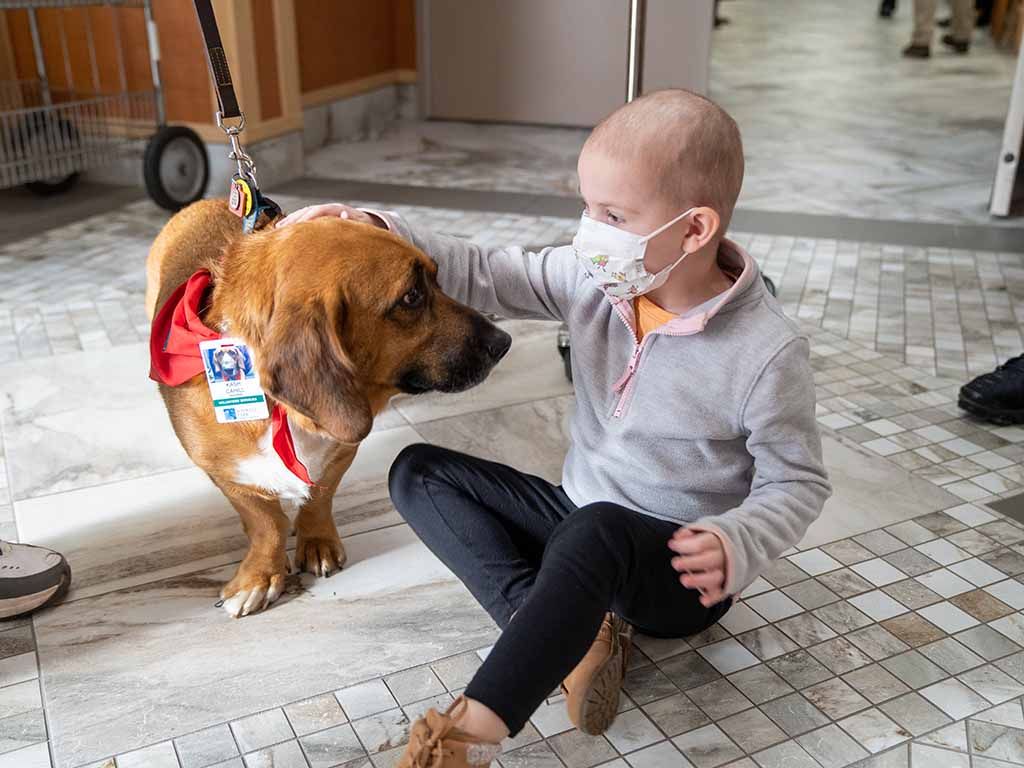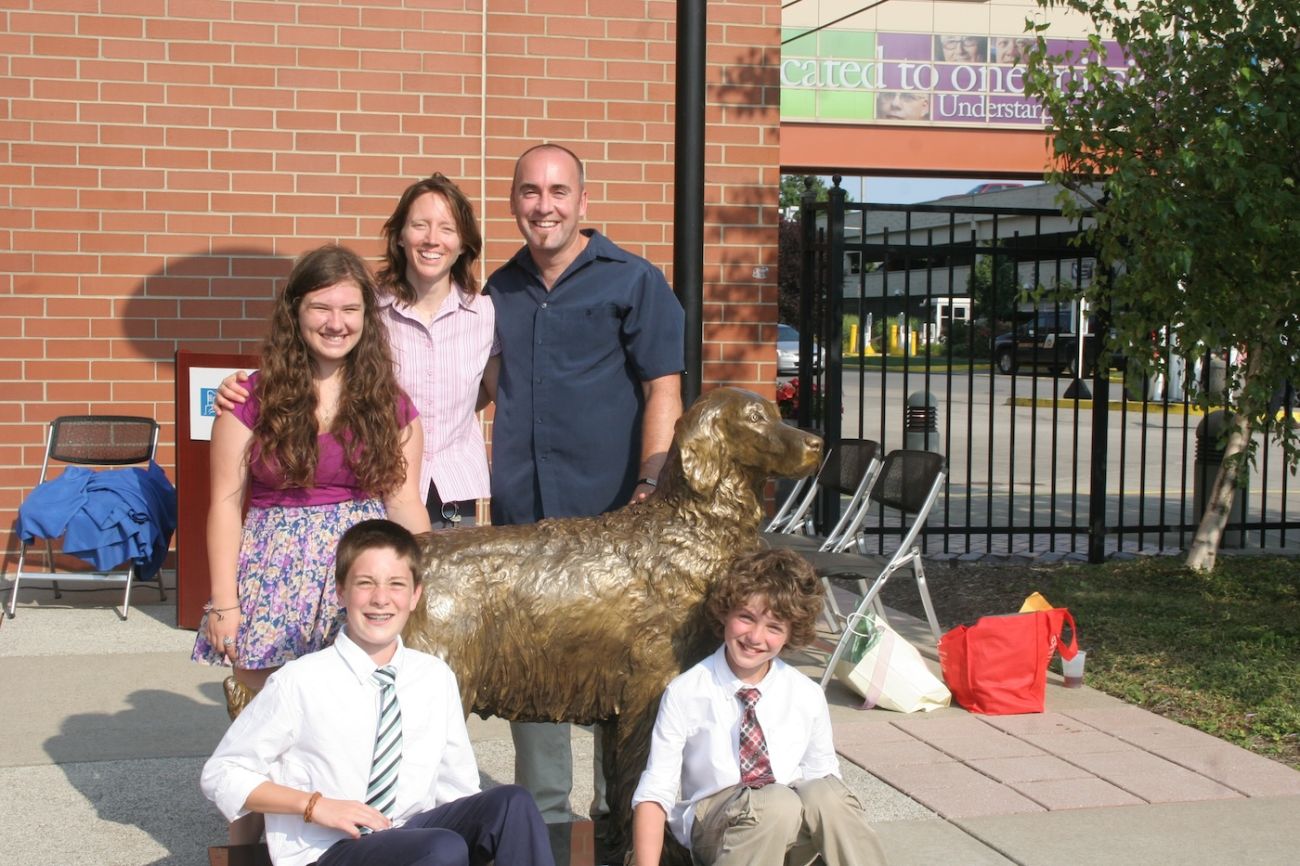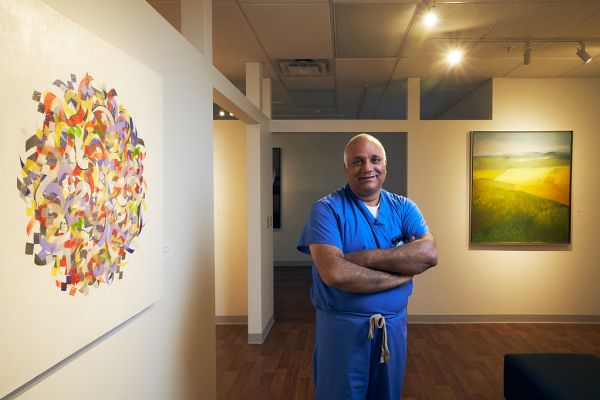Roswell Park has eight therapy dogs that visit the main hospital regularly.
If there’s a group of people gathered together, speaking excitedly in the lobby of Roswell Park Comprehensive Cancer Center, or near one of the clinics, it’s not because there’s a celebrity in town making an appearance.
It’s likely because one, or maybe two, of the dedicated team of therapy dogs who visit Roswell Park weekly are starting their very important rounds.
Since 2006, therapy dogs have been an important part of the patient experience, providing gentle support and a reason to smile, a break from a stressful time for patients, caregivers and hospital employees alike.
“It’s a healthy distraction. Studies say petting or interacting with a furry animal can lower one’s blood pressure and reduce anxieties,” says Chris Wesley, Director of Volunteer Services and Community Relations at Roswell Park, whose office oversees the therapy dog program. “A noticeable change in the person's demeanor is evident that the visit is having an impact."
The natural outpouring of affection and attention toward the seven therapy dogs who visit Roswell Park is returned by the dogs toward those who need their gentle medicine.
Monty led the way
“Once you love animals, once you have a relationship with animals, you get how much they can make you feel good. It’s always a feel-good situation,” says Nicole Gerber, an Occupational and Environmental Safety Program Manager at Roswell Park and the pet parent behind the hospital’s therapy dog program.
Her late dog, Monty, was the first four-legged friend to earn the distinction and was the inspiration for therapy dogs here. At the time, nearly 20 years ago, she was volunteering at a nursing home and saw the uplifting effect Monty had on patients there right away. Seeing how happy residents were at the ability to pet and play with a dog, even for just a few minutes, gave Nicole the idea of trying to bring that same relief to cancer patients and their loved ones.
It took some time and plenty of research to bring the program to life, borrowing from the programs established at other cancer hospitals and showing how successful they were in finding dogs specially trained to ignore some of the many distractions they might encounter inside a hospital: patients in wheelchairs, the presence of IV carts, food dropping on the floor in a busy area and other challenges.
The dogs’ handlers and owners also must agree that their dogs be bathed within 24 hours prior to their arrival at Roswell Park. This helps ensure the safest interaction with the patient population.
The testing used by the certifying agencies measure both general and specific canine behaviors. “One of the tests might be to have someone in a wheelchair with some food on their lap, just to make sure the dog walks by without trying to take the food. My dog would’ve failed that test,” she laughs.
Visiting with patients who’d like the support
When they arrive at Roswell Park, the dog’s handler and another volunteer, a therapy dog assistant, will team up and start to walk through the approved visiting areas. The therapy dog assistant volunteer is tasked with walking into waiting rooms and other places where the dogs are not permitted to go, announcing the dog's presence and inviting people to interact with the on-duty therapy dog.
“It’s about fifty-fifty: Some people will look and say no thanks, others will already be packing up their stuff eagerly to go out and visit with the dog,” Chris says.
Overall, the dogs tend to draw a cheerful crowd and their impact is immediate to the patients.
Tails of Hope Calendar
See your favorite therapy dog year-round with the 2024 Tails of Hope Calendar, available in the gift shop at Roswell Park’s Main Hospital.
These calendars are made possible thanks to a generous donation from Dave & Adam’s Card World, which is proud to support Roswell Park Comprehensive Cancer Center and our Therapy Dog Program.
Carol Propis has been bringing therapy dogs to Roswell Park patients for nearly a decade, with Wrigley showing up for duty for nine years and Hudson serving for four. The two Bernese Mountain dogs are big, fuzzy loves that always draw a crowd.
“Our most fond experience is getting to know the kids and families,” Carol says. She recalls seeing one patient, Ella, every Tuesday for several years. “The moment she saw Wrigley, regardless of how awful she was feeling, her face just lit up with this amazing smile. We would lay on the floor talking and hugging the dog. Her father would roll over Wrigley making doggie noises and Ella and I would just shake our heads.
“That child and family have left an indelible mark on Wrigley’s and my heart and soul,” she adds. “Thank you, Roswell Park, for allowing us this most memorable experience.”
The same goes for Hawk, a Golden Retriever, and handler Kelly Hartman. “Last year, when we stopped at the breast cancer waiting area, a woman was waiting for test results and she was very stressed. She came out and sat with Hawk for 30 minutes. She sat on the floor and just pet and cuddled with him the whole time. Hawk didn’t move and just sat there and was a comfort to her.”
A loving legacy of service
Even though she’s no longer an active part of the therapy dog program, Nicole is thrilled to see Monty’s legacy live on in other dogs, in addition to the life-size statue of him in Kaminski Park just outside the main gate.
“I think about, over the years, how many different dogs have come through and touched so many people,” she says. “I know from other therapy dog owners; they’ll get cards and letters from patients. It’s been wonderful to see this program that not only had such an impact when it started but continues to have an impact. It’s great to see the hospital’s made an investment in this program.
“Seeing a dog in a hospital and petting or hugging a dog can make such a difference in your day. The moment you’re around an animal, that not only takes your mind off things, it puts you in a relaxed state. I’m so thankful to Roswell Park for recognizing this program is beneficial to everyone.”



